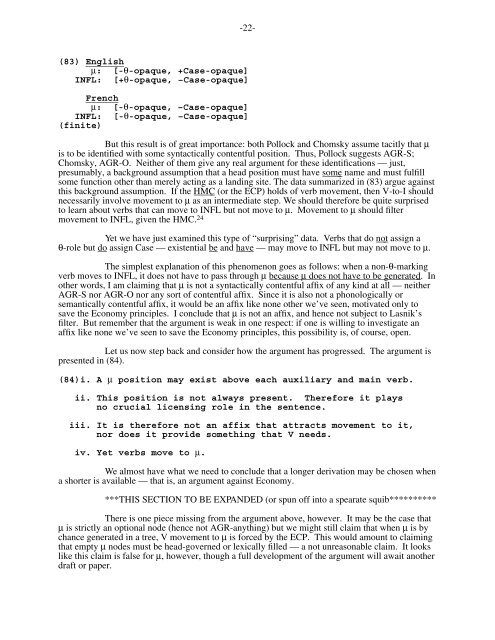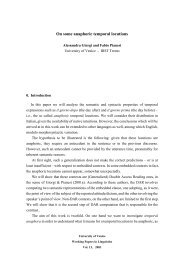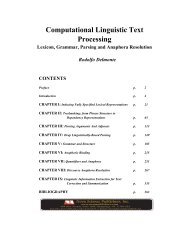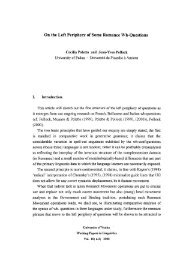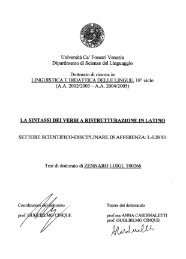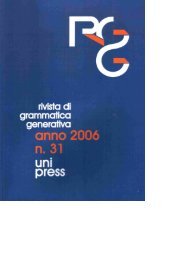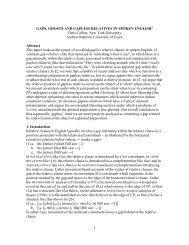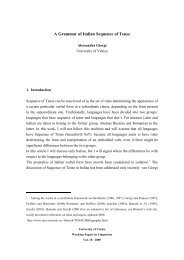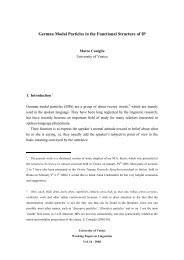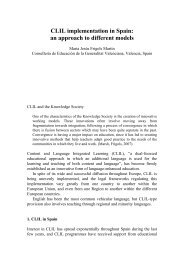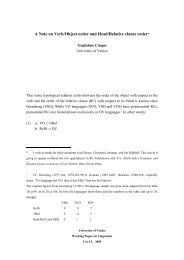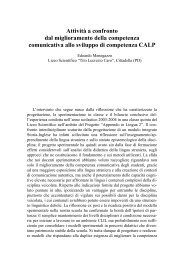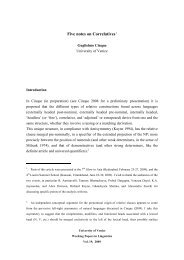Earliness Principle - Lear
Earliness Principle - Lear
Earliness Principle - Lear
Create successful ePaper yourself
Turn your PDF publications into a flip-book with our unique Google optimized e-Paper software.
-22-<br />
(83) _______ English<br />
µ: [-θ-opaque, +Case-opaque]<br />
INFL: [+θ-opaque, –Case-opaque]<br />
French ______<br />
µ: [-θ-opaque, –Case-opaque]<br />
INFL: [-θ-opaque, –Case-opaque]<br />
(finite)<br />
But this result is of great importance: both P ollock<br />
and Chomsky assume tacitly that µ<br />
is to be identified with some syntactically contentful position. Thus, P ollock<br />
suggests AGR-S;<br />
Chomsky, AGR-O. Neither of them give any real argument for these identifications — just,<br />
presumably, a background assumption that a head position must have some ____ name and must fulfill<br />
some function other than merely acting as a landing site. The data summarized in (83) argue against<br />
this background assumption. If the HMC _____ (or the ECP) holds of verb movement, then V-to-I should<br />
necessarily involve movement to µ as an intermediate step. W e should therefore be quite surprised<br />
to learn about verbs that can move to INFL but not move to µ. Movement to µ should filter<br />
movement to INFL, given the HMC. 24<br />
Y et we have just examined this type of “surprising” data. V erbs that do not ___ assign a<br />
θ-role but do __ assign Case — existential be _ _ and have ____<br />
— may move to INFL but may not move to µ.<br />
The simplest explanation of this phenomenon goes as follows: when a non-θ-marking<br />
verb moves to INFL, it does not have to pass through µ because ________________________________<br />
µ does not have to be generated. In<br />
other words, I am claiming that µ is not a syntactically contentful affix of any kind at all — neither<br />
AGR-S nor AGR-O nor any sort of contentful affix. Since it is also not a phonologically or<br />
semantically contentful affix, it would be an affix like none other we’ve seen, motivated only to<br />
save the Economy principles. I conclude that µ is not an affix, and hence not subject to Lasnik’s<br />
filter. But remember that the argument is weak in one respect: if one is willing to investigate an<br />
affix like none we’ve seen to save the Economy principles, this possibility is, of course, open.<br />
Let us now step back and consider how the argument has progressed. The argument is<br />
presented in (84).<br />
(84)i. A µ position may exist above each auxiliary and main verb.<br />
ii. This position is not always present. Therefore it plays<br />
no crucial licensing role in the sentence.<br />
iii. It is therefore not an affix that attracts movement to it,<br />
nor does it provide something that V needs.<br />
iv. Yet verbs move to µ.<br />
W e almost have what we need to conclude that a longer derivation may be chosen when<br />
a shorter is available — that is, an argument against Economy.<br />
***THIS SECTION TO BE EXP ANDED<br />
(or spun off into a spearate squib**********<br />
There is one piece missing from the argument above, however. It may be the case that<br />
µ is strictly an optional node (hence not AGR-anything) but we might still claim that when µ is by<br />
chance generated in a tree, V movement to µ is forced by the ECP. This would amount to claiming<br />
that empty µ nodes must be head-governed or lexically filled — a not unreasonable claim. It looks<br />
like this claim is false for µ, however, though a full development of the argument will await another<br />
draft or paper.


